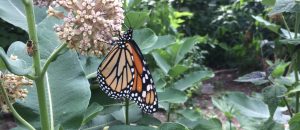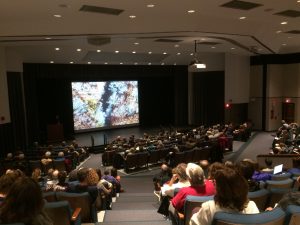West Cook Wild Ones 2017 Accomplishments
We are grateful for all of the joyful energy of our members, volunteers, and supporters over this past year. Thanks to all of you 2017 was a year of action for us. Next year will be even better.
Embracing senescence
Its hard to believe its almost time to say goodbye to 2017, though those of us working in gardens and natural systems have been saying goodbye for a while. Fewer and fewer pollinators have visited the last remaining asters. Butterflies and their caterpillars have found their winter refuges in our gardens. We have watched flowers going to seed and the seasonal shifts of our residential birds. Dark-eyed Juncoes have arrived, formed their flocks, and marked out their foraging spots. Our gardens have functioned as waystations, making lives easier or even possible for migratory birds who are traversing continents, cultures, and habitats to their overwintering grounds in South and Central America.
Pollinator footsteps
As I cleaned milkweed seed, it occurred to me that these seeds are actually footsteps of a bee or a butterfly. When you begin to question milkweed pollination, a complex mystery unfolds. For details, see: Milkweed Pollination. Put simply here, a pollen  structure must attach to a pollinators foot. The pollinator then must carry it to another flower, where it inserts this pollen package. A milkweed flower is really a cluster of many small flowers, and one flower will produce a pod of over a hundred seeds. Thanks to tiny feet (or tarsi), we can receive the next generation of milkweed.
structure must attach to a pollinators foot. The pollinator then must carry it to another flower, where it inserts this pollen package. A milkweed flower is really a cluster of many small flowers, and one flower will produce a pod of over a hundred seeds. Thanks to tiny feet (or tarsi), we can receive the next generation of milkweed.
Many such footsteps mark our gardens, whether visibly or invisibly. They might change our garden in surprising ways, bringing unexpected, wonderful visitors. Our plants continue to give all winter and support life, so please keep plants standing if you can. Everything is connected.
Connections
As you will see in the list below of what weve been up to, we joined forces with Green Community Connections (GCC) to spread the Monarch Magic. GCCs programs around Monarchs were incredibly successful. Because of Sally Stovall, Oak Park is now a Mayors for Monarchs village. The village worked hard to plant milkweed and nectar plants to support Monarchs and other pollinators. This level of collaboration was immensely gratifying as we met mutual goals and strengthened each others mission. It is vital that our organizations support each other so that we can continue to benefit from our distinctive strengths.
Our speakers make us smarter

One of the hallmarks of Wild Ones is a speakers series. As you will notice, scientists are very important to us, and many of our programs feature scientists who have expertise in different areas. We are incredibly fortunate to live in an area where professors are willing to share their research and knowledge with the public. Our other speakers are professionals in the native landscaping field, or people who have the depth of experience that comes from living with native plants. Each of them contributes to our bank of knowledge, understanding, and appreciation for the natural world that we all have inherited. Thank you to all of our speakers.
You can read month-by-month review of all of our programs and activities in the below section.
January: Program: Marla Garrison, Natural History of Odonata; Wintersowing Workshop with Linda Walker at Seguin Garden Center. Participated in Mobilizing for Monarchs, hosted by Green Community Connections

February:Program: Pam Todd, Wildly Beneficial: Native Plants at the Oak Park and River Forest Garden Club. Our big event: Beautifully Natural Garden Conference featuring Rick Darke, landscape designer and co-author with Dr Tallamy of Living Landscapes and Heather Holm, native bee expert and author of books on native pollinators.
March: Sponsored Hometown Habitat showing at One Earth Film Festival; Program: Woodland Gardens with Pat Sullivan-Schroyer;
April: Pam Todd presented at the School Garden Symposium, hosted by PlanItGreen and OPRF Communityworks. Program: Carol Rice, Using Sedges as Landscaping Plants. Byron and Laura (along with other helpful volunteers) helped out at our Earth Day table at Village of Oak Parks Earth Day celebration.
May: Program: Tim Lewis, Name that Plant: Interactive Plant ID. Pre-ordering opened for native plant sale. Multiple tabling events for Oak Parks Farmers Market Green Days, and Berwyn Farmers Market
June: Plant Sale and, new this year–125 Monarch Kits, assembled by volunteers and sold. Local school PTOs received the proceeds from kits purchased in their names. Program: Dr. Emily Minor and Stephanie Walquist, Science Needs You: Become a Citizen Scientist. Green Community Connections Kick-off Event for I Can Fly Youth Program at Harambee Gardens. WCWO Carolyn Cullen and Byron Lanning participated in Green Community Connections Monarch Presentation for Green Block Parties; Promoted the plant rescue for Dennis Paiges well-known gardens at his former condo association.
July: Program: Art Gara, Wildflower Gardens: Natures Jewelbox. Assisted the I Can Fly Program by sharing information about native plants and their connection to sustainability. With the youth team, we planted Monarch Kits at a few different locations. Carolyn continues with Monarch Green Block Parties (it was a popular option for block partiers!). Laura and Stephanie added early spring blooming flowers to the Oak Park Main Librarys garden.
August: Program: Connor Shaw, Landscaping with Small Native Trees and Shrubs. Native Garden Tour (a collaboration with Green Community Connections and the Interfaith Green Network).

September: Program: Clare Ryan, Landscape Invaders: Ornamental Problem Plants and Native Alternatives; Supported GCCs Fall Native Tree and Shrub Sale. Eco-friendly Fall Clean-up Seminar at Lurvey Gardens, presented by Stephanie Walquist. Mary Peranteau ran our table at Trailsides Monarch Fest.
October: Program: Dr. Alan Molumby, Bees, Urbanization, and Habitat Loss.
November: Remembering Art Gara. Stephanie Walquist presented to OPRF Garden Club on Butterfly Gardens. Carolyn Cullen met with Pilgrim Nursery School students and shared thoughts and observations about plants and animals.
Thank you to all of our wonderful volunteers who made all of these events possible.
New articles/posts written this year and available on our website to support gardeners: Sprezzatura in the Fall Garden, Resources to Learn about Harvesting Milkweed Seeds, Native Pollinator Basics in the Chicago Region, Milkweed Cosmos, Citizen Science Projects, Aphids: What to Do?, Power of Native Plants, and Monarch Garden Support. Then there are of the many posts on Facebook and Twitter as we build and connect with our online community.
In addition to our members, we also need to acknowledge the importance of National Wild Ones, PlanItGreen, and OPRF Communityworks. These organizations offer us financial support to help make a positive impact on our local environment.
The board meets on a monthly basis so that we can plan all of these wonderful events and decide how to move forward and to continue to help people help nature. If you are a member of Wild Ones and would like to join a group of friendly, passionate people who are working to make our chapter and communities strong, please consider joining the board. We all have different backgrounds and levels of experience with native plants, and those differences make our chapter effective. Help us make 2018 even better. Send us an e-mail.
–Stephanie and the rest of the WCWO Board
